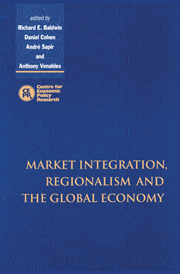1 - Introduction
Published online by Cambridge University Press: 24 February 2010
Summary
The chapters in this volume are drawn from the final conference of the CEPR's programme of research on ‘Market Integration, Regionalism and the Global Economy’ (MIRAGE). The objective of this research was to use new techniques of economic analysis to study changes in the global economy in relationship to the process of regional integration, and to draw out the policy implications of such changes. Chapters in this volume are organised in two parts. Part One (chapters 2–6) covers three international trade policy issues: regionalism and multilateralism; the political economy of trade policy; and trade income inequality. Part Two (chapters 7–11) focuses on three ‘domestic’ problems faced by regional groups: labour migration; exchange rate arrangements; and real convergence.
Chapter 2, by Winters, surveys the burgeoning literature on regionalism vs. multilateralism. Are regional integration schemes good or bad for the multilateral trading system? In the seven years since Krugman's seminal paper (1991) on the subject, the literature has progressed from analysing external tariff setting by symmetric trading blocs, through to looking at the process of bloc formation, the political economy of policy-making and the role of internal institutional arrangements within blocs in determining outcomes. Krugman's original result – that three blocs is the pessimum number from the point of view of world welfare – has been shown to be fragile, but what view of regionalism has taken its place? Winters' answer is that ‘we don't know yet’. Political economy analysis suggests that regionalism may be more attractive to producer lobbies than is multilateralism – because they get the benefits from trade diversion.
- Type
- Chapter
- Information
- Publisher: Cambridge University PressPrint publication year: 1999
- 2
- Cited by



